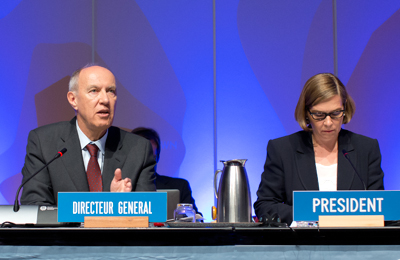Director General Opens WIPO Assemblies with Call to Help Developing-World Creators
Geneva,
September 23, 2013
PR/2013/745
Opening ceremony ![]() Video
Video
World Intellectual Property Organization (WIPO) Director General Francis Gurry opened the WIPO Assemblies of member states with a call for better linkages between developing-world creators and the worldwide online marketplace.
“Now, the Internet is a global stage” where performers and other producers can more-easily reach audiences beyond their borders, Mr. Gurry told delegates from WIPO’s 186 member states, who are convening between Sept. 23 and Oct. 3, 2013 to consider the WIPO work plan, budget and other matters for the upcoming 2014-2015 biennium.

(Photo: WIPO/E.Berrod)
“There is an unprecedented opportunity in these developments for making the developing and least developed countries part of the global digital marketplace,” said Mr. Gurry. “The developing world has traditionally been rich in content and poor in distribution. It’s home to some of the finest creators and performers in the world, but the opportunities for these creators and performers to get their works and performances into global markets have been limited.”
Mr. Gurry outlined two projects to help link these creators with consumers worldwide. The projects would seek to develop a new voluntary quality-assurance standard for collective-management organizations, while enhancing their IT systems for management of data.
“These projects offer exciting prospects for contributing to a vibrant and truly global marketplace for creative works and for assisting the developing world to translate its cultural and creative assets into commercial assets in that marketplace,” he said.
The Director General reported to delegates that WIPO’s financial position is “very sound,” with a healthy surplus. He also highlighted work in two areas that he identified as priorities for the Organization in the coming years. First, a proposed design-law treaty that would provide simpler and easier to access procedures for protecting designs. Secondly is charting “the way forward for the shared objective of providing effective protection for traditional knowledge, traditional cultural expressions and intellectual property in relation to genetic resources…It is of the utmost importance to bring this work to a successful conclusion.”
Mr. Gurry said that the highlight of the past year for WIPO and its membership was the passage of the Marrakesh Treaty to Facilitate Access to Published Works for Persons who are Blind, Visually Impaired or Otherwise Print Disabled. The treaty is designed to make it easier for appropriate-format texts for visually impaired persons to be created and transferred across boundaries.
The Assemblies elected Ms. Päivi Kairamo, who is also the Permanent Representative of Finland to the United Nations and other international organizations in Geneva, as Chairperson.
- The Director General’s opening address to the WIPO Assemblies
- The Director General’s full report to the WIPO Assemblies

- Tel: (+41 22) 338 81 61 / 338 72 24